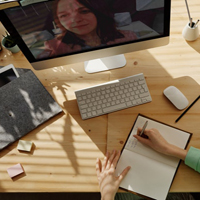Online Supportive Group as social intervention to face COVID lockdown. A qualitative study on psychotherapists, psychology trainees and students, and community people

Accepted: December 1, 2020
HTML: 20
All claims expressed in this article are solely those of the authors and do not necessarily represent those of their affiliated organizations, or those of the publisher, the editors and the reviewers. Any product that may be evaluated in this article or claim that may be made by its manufacturer is not guaranteed or endorsed by the publisher.
Authors
Several psychological interventions have been activated to help people during the coronavirus pandemic, and research highlights the crucial role of group interventions as a space for sharing and processing the psychological experiences linked to this emergency and the consequent changes in people’s lifestyles. In this context, psychologists are mostly providers of this kind of service more than users. This study aimed at investigating and comparing post-hoc the subjective experience of psychotherapists, psychology trainees and students, and individuals of the general population who participated in a psychodynamically-oriented supportive group intervention. Fifty-two subjects were enrolled to participate to focus groups aimed at exploring participants’ decision to participate, their perceptions on how the support group influenced their elaboration of the psychological effects of pandemic/lockdown, and their feedback on its utility. Transcripts of the focus groups were analyzed with the Linguistic Inquiry Word Count (LIWC). Differences in the use of words/linguistic categories between groups were tested through chi-square tests. Content analysis was conducted by independent judges who extracted the most relevant comments. Preliminary results showed the main features related to the crisis response, and how belonging to different social roles was associated with different ways of experiencing and sharing emotions. People react in different ways to traumatic events, and how people react may say a lot about how they cope with the event and the extent to which the event plays a role in the future. Clinical implications on the use of this data for future treatment planning are also discussed.
How to Cite

This work is licensed under a Creative Commons Attribution-NonCommercial 4.0 International License.
PAGEPress has chosen to apply the Creative Commons Attribution NonCommercial 4.0 International License (CC BY-NC 4.0) to all manuscripts to be published.
Similar Articles
- Francesca Locati, Pietro De Carli, Margherita Lang, Laura Parolin, The flip side of collaborative alliance: a single-case study , Research in Psychotherapy: Psychopathology, Process and Outcome: Vol. 22 No. 2 (2019)
- İsmail Volkan Gülüm, Dropout in schema therapy for personality disorders , Research in Psychotherapy: Psychopathology, Process and Outcome: Vol. 21 No. 2 (2018)
- The Editors, Clinical practice and research: the therapeutic rhythm , Research in Psychotherapy: Psychopathology, Process and Outcome: Vol. 25 No. s1 (2022): Abstract Book - XIV National Conference of the Society for Psychotherapy Research - Italian Group, Clinical practice and research: the therapeutic rhythm, November 25-26, 2022, Cremona (Italy)
You may also start an advanced similarity search for this article.

 https://doi.org/10.4081/ripppo.2020.501
https://doi.org/10.4081/ripppo.2020.501




